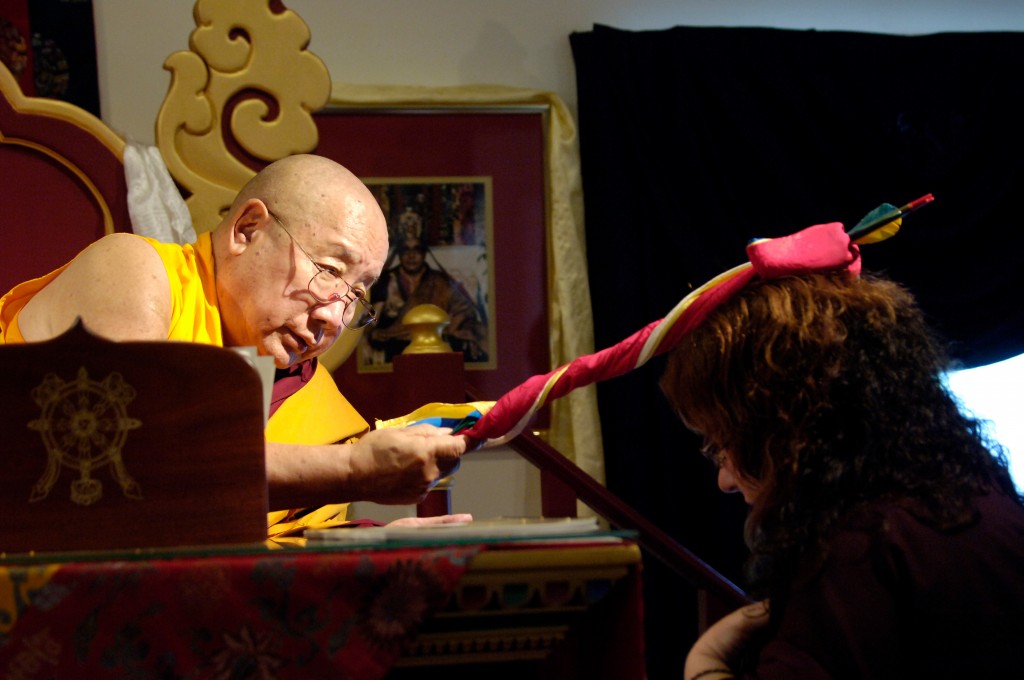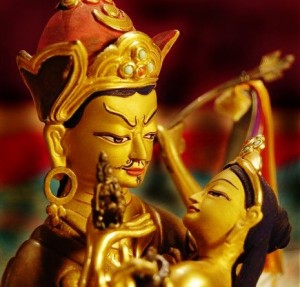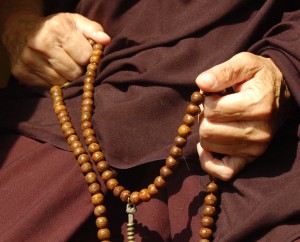The following is a photo of His Holiness Penor Rinpoche offering Empowerment to Jetsunma Ahkon Lhamo:
Jetsunma Ahkon Lhamo
Love For All Beings
[Adapted from an oral commentary given by His Holiness Penor Rinpoche in conjunction with a ceremony wherein he bestowed the bodhisattva vow upon a gathering of disciples at Namdroling in Bozeman, Montana, November 1999. —Ed.]
Think about all living beings that at some time or another, throughout the course of innumerable past lifetimes, have been your own kind father or mother. Consider how a mother will do anything for her child—even give her own life, without hesitation. Consider how all living beings have been that kind to you at some time in the past—not just once, but countless times, in countless different circumstances and situations over the course of countless lifetimes since beginningless time. Consider also that to not think carefully about repaying kindness, and thereby to go through your life without the intention to truly benefit parent sentient beings, and so to actually ignore them, is truly shameless.
Many people in the West may think, “Wait a minute! My parents were not very kind to me. In fact, we are not even close, and I don’t even like them, so why should I feel that I need to repay their kindness now?” If that is what you think, then take a moment to think about how you acquired your body. Is it not due to the kindness of your parents that you have your precious human body? From the time your consciousness entered the union of your father’s seed and your mother’s egg, your mother carried you in her own body. Her body nurtured you as you grew within it. Then with pain and difficulty she gave birth to you. Her kindness did not just stop there: for many years she cared for you and lovingly fed, cleaned, clothed, and wiped you; she provided shelter and cared for you when you were sick, and then she protected you and looked out for you constantly. If you think you don’t need to repay the kindness of your parents, just remind yourself of those events, which you were the recipient of time and time again.
If that still does not change your attitude, so that you still do not understand the kindness your parents showed you, then think about your body, the gift of your body, which is who you are; your parents gave you that. Because your parents showed you the great kindness of giving you your body, your precious life, here you are. Sure you had the causes for your precious human rebirth, but without parents you wouldn’t have your body. And you didn’t have your body, you wouldn’t be able to receive these vows.
In our present state of ignorance, we have an inability to recognize that all beings have been our parents in the past, and we certainly don’t know what the particular situations and circumstances of those lifetimes were. Nonetheless, it is certain that we have had countless sentient beings as our parents over and over again in countless past lives. The truth is, at the present time we just do not recognize that.
Imagine you are on the bank of a river with your mother and suddenly she falls in and is being carried away by the rushing water. There you stand on the bank, watching that happened. What would you do? Would you do something to try to save her, such as throw out a rope? Or would you turn your back and walk away rather than risk your own life? Would you be concerned for her, or would your concern be only for yourself? The intention of the hearers and solitary realizers can be likened to this latter case, while the intention of the Mahayana practitioners can be likened to the former. While it is important to develop attraction toward peace, you should never for any reason, be attracted to the quiescence of the hearers and solitary realizers.
From “THE PATH of the Bodhisattva: A Collection of the Thirty-Seven Practices of a Bodhisattva and Related Prayers” with a commentary by Kyabje Pema Norbu Rinpoche on the Prayer for Excellent Conduct
Compiled under the direction of Venerable Gyatrul Rinpoche Vimala Publishing 2008
Stupas: Wish Fulfilling Jewels
The following is a slideshow of images of KPC Stupas. To learn more about these Sacred Structures join us at KPC Nov. 30 – Dec. 2 for a retreat weekend with Tulku Sang Ngag Rinpoche on the Power of Stupas:
What Are Your Hopes?
The following is an excerpt from a teaching by Jetsunma Ahkon Lhamo called “Mindfulness of Cyclic Existence”
Buddhist philosophy speaks of the emptiness, or the illusory quality, of all phenomena. If self does not exist in the way that we think it does and the only true reality is the primordial wisdom state, then phenomena cannot exist in the way we think it does either because all phenomena seem to us to be something external. That perception is born of the belief of self-nature as being separate. All phenomena are perceived as external, as inherently real. The only way that phenomena can be understood is by understanding that they are separate from self. Self ends here; other begins there. And really, that is how perception comes about if you look at the perception of your own mind. That is what your perception consists of. This is universally true. It doesn’t indicate that you are a good person or a bad person; it’s simply universally true.
Buddhist philosophy speaks of a natural awakened state, a state in which perception does not depend on division, but instead is a pure experience that is free of conceptualization, free of focus in the way that we have focus. It is a pristine and luminous state. And in that state, which, of course, is the goal in this philosophy, hope and fear have no place. Again, hope and fear are dependent upon the perception of phenomena as being separate. They are dependent on the belief of self-nature as being inherently real. In this system at least, the idea of hope and fear revolves by necessity around the idea that separation exists in such a form that self – you, I – can either have something or not have something, that happiness can be controlled by having or not having, that all the experiences that are uniquely human actually revolve around having or not having. If you think about all of the goals that we’ve had in our lives, all the things that we were taught by our parents and by our schools, they are all based on that dualistic perception. They are all wrapped around hope and fear.
This is a tremendous difficulty when one sets out to understand Buddhist philosophy. If you say to a Westerner, hope and fear are not so great, they only serve to make the mind unstable, the first thing that any red-blooded American will do is completely freak out. We do that because we were brought up with hope being a noble thing. I was born in 1949, and I remember some of the leftover consciousness that my parents had from the war—something inbred into the society or the culture at that time. Even though they were no longer directly involved in war, it was very noble to be very patriotic, to have a great deal of hope in the American way, to have a great deal of fear that the American way would be taken away. There was something from that time that I think has since been more firmly planted in our society than ever it was before, even though we were founded on revolution. Of course, there is hope and fear involved in that concept as well. At any rate, it becomes so important to us that even now in this New Age, this Aquarian Age, or whatever it is that we are in the middle of, even now a person is considered to be right-minded or to have the right attitude if no matter what life deals us, no matter what happens to us, no matter how we suffer or how sick we are or how miserable we are or how awful we feel, we rise anew every day refreshed and face the day, like a good American person. This kind of attitude is considered really, really admirable, really the way to go. In fact, it is considered that if one has this attitude that things will somehow work out. It’s not for me to judge whether that’s good or bad; I am only trying to isolate the idea so that we can look at it.
We also have the idea that we should have almost a priority list of things that we are hopeful about. Actually, in our society, if you were to walk up to an ordinary, mainstream moral majority person – now, perhaps meditators are a little bit different – but, if you walk up to any one of them and say, “What are your hopes? Come on, what are your hopes? This is America. What are your hopes?” they would give you a list of what their hopes are. If there is a person that you walk up to and say, “What are your hopes?” and they say, “Well, I’m okay. I am living from day to day. I try to remain in the moment, I try to experience each moment in its fullness, and I find that that’s enough for me. I find that if I remain mindful of the fullness of each moment and live right there and don’t really think too much about hope and fear, don’t really plan too much, but remain spontaneous…” In our culture, that person is a failure. That person is considered to be inappropriate. That person’s parents would probably not be too proud of them, and I find that in myself. When my children say I am doing just fine today and that’s all I want to think about, my American motherhood just goes “sssss.” Everything inside of me tenses up and wonders what is going to happen to my poor child. It’s so much a part of us. I am saying that we don’t even realize that.
Copyright © Jetsunma Ahkon Lhamo. All rights reserved
Pulling the Threads: Hope, Fear and Stabilizing the Mind
The following is an excerpt from a teaching by Jetsunma Ahkon Lhamo called “Mindfulness of Cyclic Existence”
The subject of this teaching is the difficulty that Westerners have in coming to grips with some of the concepts that are foundational to Buddhism. They are so foundational as to be almost invisible at times. Yet the concepts are difficult for us because we have our own concepts and philosophies that argue against these that are also so foundational that they are practically invisible. They are so much a part of the fabric of our perception and our thinking that we often don’t realize these thoughts are affecting us deeply.
What happens is that when we try to get a grip on Buddhist philosophy, or when we try to become mindful in a constant way, we find that there is difficulty. We may not understand what that difficulty is, or we may find that even without our knowing we have a very superficial understanding of Buddhist concepts, or we may find that we feel there is some superficiality about our approach to the path. Yet we can’t seem to get a grip on it. We can’t seem to understand what it is that is bothering us.
I think that this particular subject is not only of importance to Buddhists, or to those that are even thinking about becoming Buddhists, or even to those that are peripherally Buddhists, but I also think it’s a subject that bears recognition by anyone who does any meditation of any kind.
In Buddhist philosophy, a tremendous amount of thought and energy goes into making one understand how to stabilize the mind. In fact, if you could boil down Buddhist philosophy, and even Buddhist practice, the underlying goal would be how to stabilize the mind. It’s a difficult concept to understand because we as Westerners and Americans have our particular idea of what stabilizing the mind must be like. In one way, we could understand stabilizing the mind by understanding the opposite. We think of a person who is unstable as being mentally deranged or something like that. We don’t realize that most ordinary people, according to Buddhist thought, have unstable minds. We don’t realize that this is actually one of the symptoms or conditions that is prevalent in what Buddhists call samsara, or cyclic existence. But in fact this is true, and we must learn to recognize the lack of stability in our own minds.
One of the first ways in which that lack of stability is addressed is by addressing the attachment or the attraction that we have, or even the grasping that we have, toward hope and fear. This is something that you hear about again and again and again in the Buddha’s teaching: how attached we are to hope and fear, how difficult hope and fear are, and how these things lead to an unstable mind. It’s very hard for Westerners to understand. I would like to describe some of the Buddhist thought on the attachment to hope and fear, but more I would like to concentrate on why it is that Westerners have such a difficult time with this concept. If we can understand why we have such a difficult time with it, we may understand that in one way we have never really isolated the ideas of hope and fear, put them out in front of us so that we can really examine how much a part of the fabric of our minds these concepts are.
As a Westerner, there is actually an underlying – and even, I think, overt attitude – that is considered to be admirable or noble. We certainly have our particular norms, our own particular standards, our own particular attitudes that are unique to the Western world and specifically unique to Americans. Without going to the trouble of isolating all of them, I’d like to say that we have a certain picture or image that we’ve grown up with. Of course, it changes from generation to generation, but until very recently not that much. Still, there are some threads that continue generation to generation. We have our own particular image, our own particular ideal. What usually happens is if we grow up with an image or an ideal, it becomes so much a part of us, so ingrained, so woven into our particular emotional and mental and philosophical tapestry, that we don’t notice it, in the same way that you might look at a woven blanket and see a certain array of colors within the blanket. You really wouldn’t pick out the pink in there or the blue, or really isolate them in that way. In the same way, we have attitudes that are woven in. They are part of our structure. Therefore, they are never pulled out. The thread is never pulled out, never really isolated. Hope and fear certainly are in there, and our particular attitude toward hope and fear, as a Westerner, should be examined. When looked at next to the Buddhist ideas about hope and fear, we might come to some shocking awareness.
Copyright © Jetsunma Ahkon Lhamo. All rights reserved
How We See Enlightenment
The following is an excerpt from a teaching by Jetsunma Ahkon Lhamo called “Guru Yoga”
If Guru Rinpoche is the Nirmanakaya form of the Buddha, we should also think that he is Enlightenment itself, that what we are seeing is merely the tip of the iceberg. It’s the way in which that function of enlightenment appears in the world. Is it always so? Does enlightenment appear in the world? Why does it? What is it when it appears in the world and what is it when it doesn’t appear in the world? What is it, actually?
Very hard to describe what enlightenment actually is. Because when we describe enlightenment, it’s like looking at the sky through a tiny peephole. You can’t really get what it is. You might be able to see the spaciousness of it. You might even be able to hook into a star. You might even be able to describe color and the way the star glimmers. But from looking through a peephole, you simply cannot understand what the sky is. It’s impossible. And from our point of view, it is impossible to understand what enlightenment is by looking as we do through our little peephole.
We can only understand enlightenment really in terms of what it is not. We can understand, for instance, that enlightenment is the state free of conceptualization. We can understand that it is a state free of contrivance. We can understand that it is a state unlimited by ordinary view, ordinary perception. But we can’t really understand what else there is. In fact if you described “some thing else,” you’ve lost the pristine nature of enlightenment, because if you do that, you are conceptualizing. You are limiting, and you are contriving, an image or an experience. That’s the way our minds work. That’s the only way that we have.
When the Buddha described himself, he described himself as being “awake”. Simply that. We can’t even understand what that means because we immediately want to say, “Awake to what? And what were you asleep in before?” We try to understand in those ways. It’s either/or, black or white. Our minds hook on to something. And for that reason, we cannot fully and completely understand enlightenment.
In short, enlightenment has been described as the primordial wisdom state, that state which is like luminosity. But it isn’t luminosity because when we think of luminosity, we think of light and light is “some thing.” This state called enlightenment is not a thing at all. It is beyond “thing-ness” and “no thing-ness.” It is beyond form and formless. It is beyond self and other. It is beyond up and down. It is beyond hot and cold. It is beyond dark and light.
Copyright © Jetsunma Ahkon Lhamo. All rights reserved
Extraordinary Blessings
The following is an excerpt from a teaching by Jetsunma Ahkon Lhamo called “Guru Yoga”
One of the main practices that we have to do in order to make progress on the path is Guru Yoga. There are many ways to practice Guru Yoga. There is a tremendous focus on Guru Yoga in the preliminary practice or Ngondro phase, and then as you move into the different forms of practice in the intermediate and advanced stages, there is still a great deal of focus on Guru Rinpoche, and there is still a great deal of dependence on the Natural Blessing that is transmitted from his miraculous compassion.
Guru Rinpoche is considered to be the Nirmanakaya form, that is the body or the form that one sees in physical existence. He incarnated into physical existence, and when he appeared on the earth, he was in solid form. According to the history of his life, he was not born. He did not have a mother. He appeared in the middle of a lake on a lotus and he did not appear as an infant, but as a young child. And when he left, he didn’t die; his body didn’t cease to function. He was seen to rise up into the sky and leave.
So his activity, his display, is considered to be extraordinary, not ordinary. It isn’t like what we usually see. We do not usually see that kind of event. None of us has managed to be born on a lotus in the middle of the lake. Most of us have mothers. I have a mother. If any of you don’t have a mother, please let me know. I’d like to meet you, get to know you.
Probably, when we die, our bodies will do the ordinary thing which is “die.” Perhaps a few of us will do something wonderful, but my guess is that we’ll die. It’s very rare to be born as a young child on a lotus, or rise up into the sky and leave. We don’t usually see that kind of display. And so from that, we can understand that he is, in fact, the physical display of enlightenment.
It’s so easy for us to look at Guru Rinpoche, to think about his teachings, to think about what he has accomplished and think, “Oh, there was a great man that was born sometime, and he did this thing”, to think of Guru Rinpoche in a superficial way. So when we practice, our practice is deluded really, and it’s kind of confused or even defiled, if you will, by our thinking, “What kind of man was he? What was he really like? What did he look like?” I look at his statue and I think, “Gee he had a funny little mustache.” We have those kinds of thoughts. We can’t help but think like that. We think as ordinary people do. We look at each other in ordinary ways. We’ve learned to evaluate things in that way.
If we hold Guru Rinpoche in that regard, we miss the point. We think of a being that’s much like an ordinary being. We think of an event that is not so different from ordinary events. Man goes to Tibet, man teaches. Well, that’s happened before! So we don’t understand. We’re very shallow in our perception. And what happens then is that the transmission that comes to us, the blessing that comes to us through faith, the blessing that comes to us through practicing Guru Yoga is very minimal. And in fact, it’s an ordinary blessing. It is the ordinary blessing perhaps of having the opportunity to practice, and of actually having the practices in hand so that we can do them. Well, you could say that’s not exactly ordinary. Lot’s of people don’t have that blessing. And you’re right about that. But it’s a limited blessing. What we need beyond this opportunity, beyond the practice, is the ripening. And in order to have that, we must begin to understand the Nature of the Lama in a more profound way.
Copyright © Jetsunma Ahkon Lhamo. All rights reserved
Choices – Like a King or a Queen
The following is an excerpt from a teaching by Jetsunma Ahkon Lhamo called “Entering the Path”
It is not only in the beginning of the path that obstacles happen; they occur periodically throughout your experience of the path. They don’t end. They are like PMS. So each and every time obstacles arise, you have to simply support and nurture yourself. Go through it. Simply take yourself by the hand as if you were a child. Think of this as your kingdom, and you’re a good king or a queen. What should you do to responsibly negotiate yourself through this? You think like that.
Remember the first and most important point to consider: not to make it a big deal. Don’t get yourself all worked up. Try to keep your mind calm, because remember, the obstacles will ripen more quickly and more violently if the mind is excitable, emotional and violent, if it has so many ups and downs. So take yourself to a movie or something, you know, calm down and walk yourself through this. Remember that the biggest tool that you have right now is the accumulation of merit. Within the continuum of your mindstream there are cause-and-effect relationships that have not yet fully ripened. The causes are deeply embedded within your mind. Accumulate more merit and the more meritorious causes from the past will be drawn forth and will come to your rescue.
The name of the game is to pacify obstacles and to draw forth and accumulate as much merit as possible. The mind will become spacious so that we can awaken in incremental degrees to our own nature. To the degree that we begin to awaken to our nature, to that degree, obstacles will no longer affect us.
Upon attaining the Bodhisattva path and moving through that path to the higher bhumis, one is no longer susceptible in the same way to cause-and-effect relationships. They become pacified within the mindstream. They are still expressed in some way, to exhibit the normal characteristics of life. Yet the high level Bodhisattva is not hooked and condemned by these obstacles the way ordinary sentient beings are. These obstacles do not cause them to wander in samsara the way ordinary sentient beings do. So that’s what we have to look forward to. The name of the game is pacifying obstacles and bringing forth as much merit and opportunity as possible until that day happens. For this you can use the practices.
The moment you decide to be on the path and practice, you should immediately begin to accumulate the Seven-Line Prayer. Repeat it on a regular basis every day. That is a merit machine for you. Then as soon as possible, as soon as you have accumulated approximately 10,000, begin to practice Ngöndro or preliminary practice. The reason why it is set up that way is so that the mind can develop and open up to the primordial wisdom nature.
This is the opportunity that you have, and this is the method that you should use. Be your own best friend. Be a good king or queen. Be intelligent and responsible and think beneath the surface. Do not read the things on the surface any more. That’s for children; that’s not for you. You’re on the path now. Look deeper and see what’s happening. Antidote unhappiness with virtue because unhappiness is caused by non-virtue. Accumulate virtue to the degree that you can begin to experience the truly virtuous nature that is your nature. Because if that nature that you truly are were allowed to express itself unimpeded, the display of that nature is the very Bodhicitta or great compassion that we try so hard to emulate.
Your nature is in truth that great unequalled Bodhicitta. You are not a bag of non-virtue; you are suchness, you are that great kindness. When you practice in that way, it’s like cleaning a glass by which the sun can shine through, and the sun is your nature. But do not let your image of the sun be closed down or distorted because of your own habitual tendency to simply ride on the surface and do whatever you think seems right. For the first time, look deeper and understand cause-and-effect relationships. Implement the causes that will bring about happiness and freedom, and pacify, through suppression, those non-virtuous characteristics that will bring you unrest and suffering.
How does this suppression look? Not like faking it and pretending you don’t have these things. That is not suppressing, that is neurosis. That is acting inappropriately. Suppression means that you take the antidote, and you apply it through practice, through contemplation, through offering, through generosity, through kindness. Practicing these things is suppression because the mind remains firm and stable in the way of virtue rather than remaining caught up in amplifying non-virtue.
You are a creature of choices. Isn’t it amazing! A creature of choices! At every turn you can make choices. You cannot choose what experiences seem to come to you because the cause-and-effect relationships have already been laid out for them, but you can choose how to respond, and you can choose how to create future causes. And for this I am exceedingly glad. Choose well then, not like a child. Choose like a king or a queen— noble, thoughtful, educated and sound in your mind. Create the habit of virtue and you will create a kingdom of virtue that will be your life.
Copyright © Jetsunma Ahkon Lhamo. All rights reserved
How to Deal with Obstacles on the Path
The following is an excerpt from a teaching by Jetsunma Ahkon Lhamo called “Entering the Path”
When obstacles arise on the path, the thing to do is to accumulate as much merit as possible. Do everything that you can, letting your mind relax. And in a relaxed way simply proceed with intelligent antidotes to what is coming up in your mind. In other words, don’t look at everything so superficially. When this begins to happen to you, don’t say, “Oh, things out there are affecting me badly, so I am going to run away.” Instead, look deeper for once, look deeper. See what’s happening beneath the surface, and say to yourself, “Part of my mind that I don’t particularly like or feel comfortable with is ripening now. I am unhappy with these causes, these habitual tendencies. I am really unhappy with them. I am suffering with them. Good that they’re coming up now that I have met the path. Good that they’re coming up now while I can ask for guidance from my teacher. Good that they’re coming up now when I know how to pray and ask for help.” Think like that. Try to stay calm, stay calm and think, “This will pass.”
If all you can do is simply say your prayers very gently and very calmly, if that’s all you can hold on to, then do that. Mostly, remain stable in your mind. Remain calm. Take yourself by the hand. Don’t give into excessive emotion.
What would you do if you had a child who was just upset and she or he could not get themselves together, simply could not get their heads turned around, were having a terrible, bad day? That’s really how it is in the great scheme of things. It’s just a big, bad day. Would you say to the child, “Yeah, you’re right, things are really nasty, and you have a great reason for being nasty! Let’s be nasty together!” You wouldn’t say that to a child. That would be stupid. You’d be a moron to say that.
You would sit the child on your knee and say to the child, “Do you understand what’s happening here? You’re being hit with a lot right now. Well, we’re just going to ride this through together. Let’s just say our prayers together and not think about it.” You hold a child. You comfort a child who’s messed up like that and can’t pull themselves together, and you help them stop. You make them feel safe by holding on to them tightly. You make them feel calm by talking calmly to them. You distract them by giving them something to do that feels like they’re accomplishing something.
Well, do that for yourself. Be your own mommy or daddy. Be your own best friend. Make yourself feel safe by supplying structure in your life, the structure of an everyday practice that you do not deviate from. Make yourself feel safe, as though you had put your arms around yourself.
The second thing that you would do is to make yourself feel comforted. Feed yourself. Provide ways to relax yourself. Provide a period of time every day where perhaps you can take a walk, or you can listen to some music, or you can just think or be happy or just meditate on joy. Just relax. Calm yourself down. Talk to yourself nicely. Tell yourself, “This is just a bad day. This will pass. Everything in samsara is impermanent. The thing to do is to continue to work through it.”
The next thing that you might do is provide some distraction or some diversion because when you get hit with ripening obstacles, you feel like a victim. You feel like something outside is hurting you, and hurting you badly. You feel under attack. You feel incapable of helping yourself. Rather than panicking and getting all wacko, give yourself something to do. Read a Dharma book. Read about cause and effect. Begin to calm the mind through reading those kinds of teachings that are geared toward calming the mind.
For instance, The Guide to the Bodhisattva’s Way of Life would be an excellent choice for a period like that. It’s inspiring, calming. You can read about the essential experience of a very pure Bodhisattva. That kind of nourishment might be like being with a child who is having a very difficult time. You wouldn’t reason with a child and do mental therapy and try to lecture them in some ridiculous way because a child won’t understand that. They’ll only be mad at you. Instead, you would just be with them. In the same way, be with yourself. Don’t lecture yourself. Don’t moralize at yourself. Be with yourself. Ride it through. Fill your mind with nourishment, with comfort. Be calm. Be confident. You’re on a good boat, one that has travelled the ocean of suffering many times.
Copyright © Jetsunma Ahkon Lhamo. All rights reserved
When Obstacles Arise
The following is an excerpt from a teaching by Jetsunma Ahkon Lhamo called “Entering the Path”
The thing to do when entering the path, in order to take responsibility and to stabilize your mind and your practice, is to begin to accumulate merit in a consistent and intelligent way. That doesn’t mean talk about it. That doesn’t mean dress up for it, like, “I’m a Dharma practitioner and the first thing I need are coral beads because that’s what she has.” People do think like that when they come to the path, and it’s a little silly. Just back off from that.
Think to yourself, “How can I accumulate virtue and merit? How can I stabilize my mind and my practice through providing the causes and the nourishment that I need?” You could for once be your own friend! Just for once give yourself the food, the nourishment, the fuel that you need. The way to do that is to accumulate virtue and merit through acts of generosity, through contemplation, through study, through providing a way for others to hear Dharma, through making offerings, through kindness, through following the instructions of your teacher. Your teacher has given you methods to accumulate merit and virtue, so do them consistently in a calm and relaxed way. In this way, your first moving onto the path will be relatively painless.
One of the things that students experience when they first come onto the path is hidden body karma. You see, it’s already there. Can you understand that concept? You already have this body karma. It will ripen anyway at some point. Better that it should ripen under the guidance and tutelage of your teacher and of the path.
Let’s say that you have some body karma near the surface of your mind. Sometimes a person will come to the path and literally catch the flu or a disease, cut themselves, or maybe even break a leg, something like that. I’ve seen that happen. Usually it’s not a big deal, but I’ve seen it happen. The thing to do then is to immediately turn the mind, in a relaxed way, toward accumulating virtue and merit rather than freaking out. Most people freak out. “I went to Dharma, and I broke my leg! Screech!” That’s their intelligent response. Hey, you would have broken the leg anyway, maybe both legs, but at least you had some merit going there. So who knows what could have happened? The intelligent thing to do is to thank Guru Rinpoche for this blessing—a benign ripening that indicates to you what the condition of your present cause-and-effect relationships actually are—and for having been given the tool to work through this. So you begin to practice and accumulate merit.
Some people come to the path and they seem really, really nice. You think, “Isn’t that a nice person! Such a nice person!” And then they’re on the path maybe six months, and suddenly it’s like they grow fangs and turn into something completely different. And you wonder whatever happened to that nice, easygoing person. They turn into something that looks like Freddy Krueger or something, I don’t know. You know who Freddy Krueger is? He’s that really scary guy. So they turn into somebody really, really horrible. Why is that ? Right underneath the surface of their mind, there was sort of a bag or a ball of ripening non-virtue that was going to come to the surface anyway.
It might have come in dribs and drabs and made them just periodically mean throughout the rest of their life, like Dr. Jekyll and Mr. Hyde. Or who knows? They might have put themself in a very wonderful situation and maybe – here’s a hypothetical situation – gotten married and then turned into the nightmare on Elm Street. Who knows what could have happened? Who knows how it might have ripened? But sometimes it happens that a deep disturbance in the mind will simply come to the surface, and for a while, that person will not seem like themselves at all.
What do you think needs to happen then? If a big obstacle comes to the surface and ripens when you first meet the path, you can see how endangered you are, can’t you? That’s a terrible danger because if you’re sick and your mind become disturbed, there’s no telling what you’ll do. You have seen yourselves react in unpredictable ways. You think you know yourselves. Then you’re faced with a situation in which you act completely unpredictably due to your emotions being really roused up. We all think we know how we’re going to act, but then we see ourselves when we really get an emotional head of steam going. We often act differently than we think we might have acted.
Well, if you have that kind of mental ripening when you first come to the path, that’s the most dangerous obstacle of all because the mind changes. Being of clear mind and clear thought coming to the path, you might say, “Yes, I have earned this. This is the method. I wish to abandon samsara. I wish to do this for the sake of sentient beings.” It sounds like pretty decent, logical and sound thinking to me. Then when the obstacle hits, your mind might be in a completely different place, and you might say, “I don’t have to. I don’t want to. I won’t!” Your mind just changes, and a part of you that you hardly ever relate to, that you mostly suppress, comes out and takes over. I’ve seen it happen. It will simply take over. What should you do at that point? Once an obstacle like that has begun to ripen, it’s very, very, very hard, particularly in the beginning when you’re an infant on the path and unable to really utilize all the tools.
But I say to you that the best thing to do at that time is to take refuge in the Guru, in the Buddha, in the Dharma and in the Sangha with all your heart. Take refuge. In your own mind say, “These are impure qualities. Samsara is not perfect. Therefore I take refuge and wish to be free.” Just like that. Hold on to that. Don’t let go of that. It is precious and important and necessary.
Copyright © Jetsunma Ahkon Lhamo. All rights reserved








